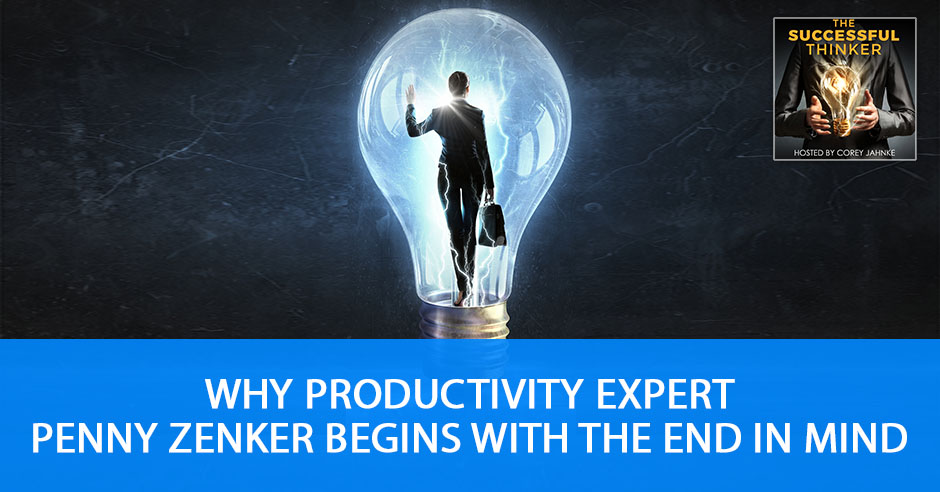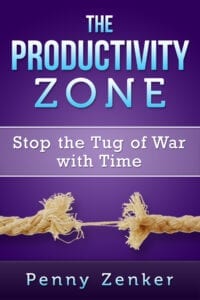
How we manage our energy makes a difference for what we get out of our time. Productivity specialist and energy management expert Penny Zenker shares an early morning cup of coffee with host Corey Jahnke while discussing how time management is really about thought and energy management. Penny shares numerous stories and examples of how to reframe your mind in order to help the listener recognize how their thinking truly affects their ability to perform and to make the biggest impact possible for them and those they love. Penny and Corey dive deep on how to become your best self, challenge your urgencies, and get more joy out of life.
—
Listen to the podcast here:
Why Productivity Expert Penny Zenker Begins With The End In Mind
How To Reframe Your Relationship With Time

The Productivity Zone: Stop the Tug of War with Time
I’ve got a special treat for you. I have had the pleasure of meeting this wonderful person who has done TED Talks, is an international business speaker, strategy coach and a bestselling author. Before her 31st birthday, this lady, my friend, Penny Zenker, founded, developed and sold her first million-dollar business. Later, she managed business units turns-arounds and was a Tony Robbins business coach. Penny is one of America’s leading experts in the psychology of productivity to eliminate distraction, perfectionism and self-sabotage because Penny wants you to maximize the results in every area of your life.
Over the past two decades, she has coached thousands of entrepreneurs, executives and business leaders to do the same. Penny’s book, The Productivity Zone, was an Amazon bestseller. Her TED Talk, which I’ve listened to, The Energy of Thought, has gained attention around the world. Her engaging, inspiring talks teach people to think and act more strategically. Penny has been featured on NBC Incorporated and the Wharton Business radio program among others. Penny, I’m really excited to have the opportunity to chat with you and I’m hoping things are going well out there in the East Coast. How’s it going?
Things are great. We are looking at spring. I took a four-hour bike ride and I am so excited that the weather is changing.
That’s amazing because it’s funny to me when you live in these northern climates like we do how 50 is super warm in March and so forth. What you just described is the energy with which you approach life. What came to mind as I was preparing for the interview is that a lot of people are worried about, “How can I fit it all in? How can I do it all?” I come to the opinion that you take a different approach to time management and productivity. Could you tell us how you go about life?
I, like many people, have a lot of hats that I wear, a lot of things that need to get done. It is a challenge. It’s been an age-old challenge. They’ve been talking about time management, balance, success, fulfillment, all of these topics which pretty much are around the same thing. You mentioned the energy in which I approach life. I believe, and this was something that I found out later in life, is that it’s really how we manage our energy that makes a difference for what we get out of our time. Many people are so focused on time and when we focus on time, it’s stressful. It creates more stress on us because we can’t control time. If we’re focused on the ticking, there are some advantages that you can use time to your advantage, but it’s not what makes us more productive. Time never will be and never was a measure of our productivity. The energy that we bring to each and every minute is going to determine whether we have a rock and roll day or whether we have a death by a thousand paper cuts day.
I’d never heard it put it that way, but I love that. Most people are trying to figure out, “How can I fit it all in?” It seems to me that maybe the right question should be, “Should I fit any of this in?” One of the things I did in preparing for this interview was I listened to you in a different interview and you said something that really intrigued me. You said that we need to challenge our urgencies. Can you lay that out as to what you were referring to and how that operates on a day-to-day basis?
I think it comes from the fact that we have a culture where we’re built on top of urgency. We created a sense of urgency. That’s what makes America, but it’s gotten ten times worse with technology. It affects our psychology. Not only do we have that inner urgency of wanting to succeed, wanting to do things and be more and all of those things that go into urgency, but now we have the technology factor that makes the expectation that we need to respond immediately. I forget the latest statistics on text responses, but it’s within two minutes that the people would respond and the average is within 30 seconds. We have this thing now where it’s not okay to say no to something. It’s not okay to say, “I’m not going to answer that email, that text message. It’s not okay to turn my phone off.” We create, especially entrepreneurs. That’s my biggest nemesis. I’m exactly like that. If a client asks me that they want to do a project together, I assume immediately that it’s urgent and I need to do that proposal by tomorrow. Do you feel like the sense of urgency that gnaws on you, Corey?
There are always ways to reframe your thinking into more positive and empowering thoughts that serve you. Share on XThat’s one of the things that’s really interesting as a pharmacist. Everybody and their brother is like, “Drop what you’re doing and work on my problem.”
They expect that.
I know you probably know the studies like the back of your hand, but they talk in terms of how long it takes you to get refocused on what it was that you were doing.
I think they say about 30 minutes, but it depends on what it is. It’s significant, but the thing is that drop what you’re doing and focus on my thing is not just in the pharmacy world. This is everywhere. Everyone has this expectation. They want to get it off their chest so they’re going to send a work email at 4:00 AM because for some reason they’re up at 4:00 AM or at 10:00 PM before they go to bed. As the receiver, we have to train people how to treat us. We have to question the things that we’ve identified as urgent like we have to question any of the thoughts that we have because our first thought isn’t always what’s good for us. It’s impulsive. We’re fighting those impulses to be more purposeful. How we balance urgency and importance is that we recognize that the first answer might be impulsive and we have to say, “Is this really important?”
By asking ourselves, “Is this really urgent? Do we need to do that now?” maybe it needs to be done someday and maybe not, but not now. That’s how we gain a little bit of control back in our lives is to question ourselves whether it’s urgent. I speak on a lot of stages and to a lot of different groups. I find that people are just like I was. I didn’t ask the question, I assumed it was urgent from the other party’s perspective. When I started to ask the simple questions of, “When do you need this by?” it was amazing how much time freed up in my schedule because they didn’t need it tomorrow. “I’m going on vacation. I don’t need that for another week.” Thank goodness I asked. I’d be disappointed if I rushed it out there and didn’t hear anything from them in that period of time.
We need to get comfortable even if it’s our boss asking us. Not everybody’s an entrepreneur and their own boss. They have to be more structured in asking themselves that question. If your boss comes to you, a lot of people I hear them say, “I can’t say no. It’s my boss.” You’re not saying no. You’re saying, “I’m working on X, Y and Z for you right now. This is the level of importance in the prioritization that I have right now. Would you like me to change that or where would you like me to fit this item in?” All I did was get curious and ask a question. Now, I don’t have to take all that stress on me. I can level it off by asking the person who’s giving it to me and what level of importance it has with everything else.

Productivity: When we’re connected to our heart, we’re going to be able to get past difficult situations and challenges much easier because we’re focused on why it’s important.
It reminds me of the story that you were telling on the TED Talk about how when you were in the scuba diving event and your brain started to take over and your physiology started to go off and you started to panic and be frightened. A lot of people do that. Their boss or a coworker or somebody asks them something and they immediately go down this unhealthy cascade, “If I don’t do this right away, I’m going to get fired.” What you’re talking about is, “Let me take control of the physiology, so that ultimately I can do a better job for my boss and get better results.” At least this is the way I’m interpreting it. A lot of times I think we sacrifice quality for urgency. The other thing that comes to mind is one of my favorite authors, Brian Tracy. Brian talks about the worst use of time is to do something very well that need not be done at all.
I call it good enough. We’ve got to also get comfortable in understanding what’s good enough.
When you were talking about your scuba diving experience, you listed a four-step process that you used to really get your brain where you want it to go or set another way to where it serves you most effectively. Would you be willing to share those four points and how you make them work in your life?
I want to point out that it’s not four steps in a sequence. It can be. However, you can use any one of these four to get yourself in a better mindset, get yourself into a place where you’re more purposeful about what you’re doing. Physiology is one of them, but they help you to manage it. Our body goes into a fight, flight or freeze mode when we get into those stressful situations. Getting our heart rate and getting control of our physiology also helps us to think better. We can talk about those four individually. The first one is purpose and motivation. It’s really getting clear on why you’re doing something because that’ll help you to determine whether it’s a priority.
I use them interchangeably because sometimes people don’t understand what I mean by purpose. What’s motivating you? Check in with your goal. If this is a business-oriented thing and you want to make sure you’re setting priorities, are your priorities in line with what your goal is so that you can really be motivated to do what you’re doing? Simon Sinek talks about the why and leading from why and how successful companies are bringing people along because they’re connected to why it’s important. It’s connecting us to our heart. When we’re connected to our heart, we’re going to bring more energy to it and we’re going to be able to get past difficult situations and challenges much easier because we’re focused on why it’s important.
I liked that because so many people are stuck in the paradigm of the way we’ve always done it is the way we’re going to have to keep doing it. There are a lot of areas in your life where you’re doing that to yourself. Obviously, we’re a whole different society than we were when you and I first got out of college.
Many people are so focused on time, and when we focus on time, it's stressful. Share on XI think that’s outside of these four areas that might be under focus for me because we’re so narrowly focused that we do not see the big picture. When you can take a step back and see the big picture, then you have the right balance of focus. You need to have a strategic focus. You need to have what I call mental focus so that you’re focusing on what you want versus what you don’t want, then the attention in the moment towards all of those. That gives us a balance of what I call laser focus. Otherwise, we focus on the wrong things. That’s where we continue to do the things we’ve done in the past is because we’re not seeing and questioning how else could I achieve this goal, especially if the constraints are different? We can take that as a focus point.
The second one of those is focus. It’s understanding and focusing on the things that are going to create what you want. Also, that mental focus. I always say we all think that grass is greener and we all think that the grass is greener on the other side, but the grass is greener where we water it. That means don’t focus on the other side and think that that’s so much better. Focus on the side that you’re on and do the things that you need to do to make the grass grow there. When you get to the other side, it’s going to turn brown as well if you’re not watering it.
I’ve been trying to water both lawns. It’s just exhausting.
It is exhausting. That brings us to the third point, which is self-talk. What is one of the things that kills that grass and keeps you focused on the wrong things on the other side or sabotaging yourself? It’s what we say to ourselves. You mentioned the TEDx that I did. It’s called The Energy of Thought. I talk about how we have 70,000 thoughts a day. That’s a lot of thoughts. The really interesting part is that only 5% of those thoughts are new. That means we repeat the same thing over and over again. This is science. They did a study and this is what they say in science. This isn’t just me saying this. That’s powerful.
If you think about what is it that I say to myself, even if it’s unconscious, bring it to our consciousness. It’s so that we know what percentage of that is negative, throwing us off, taking us away from what’s important to us and creating all those urgencies that aren’t even urgent. When we start to bring it into our consciousness and challenge it and say, “Is that really true?” Byron Katie has that, “Ask that four times and you get a totally different picture of whether what we’re saying to our self is true because not everything that we say to ourselves is true.”
In fact, I would argue that most things we say to ourselves are untrue.

Productivity: Toyota uses the five whys method. They ask “why is this happening” five times or more until they get to the root cause.
We were talking that I’m a master re-framer and that goes with my thoughts and the things that I say. You may have heard this. I think I used this on some of my interviews, but it’s so valuable and it’s one of the core strategies that I learned later in life that this is what I do. We all say to ourselves one time, “What does this mean?” If anything happens, we say, “What does this mean?” We give it a meaning and we move on. Very often, that initial meaning is not positive. It’s those automatic negative thoughts that come up. We have to train ourselves to challenge that and say, “What else could this mean?” The Byron Katie question, “Is this true?” it functions with the same principle is the more times we ask ourselves something, the more perspective that we get. I like this method because it enables me to come up with what else could this mean? It could mean this and it could mean that.
In my divorce process, it was a really hard time in my life. Not to go into any details, but I could have felt betrayed. What does that mean? It could mean betrayal. It could mean a lot of things on that side. I decided to say, “What else does this mean?” It could mean that our time is over and we had a great time, but now it’s meant for something else. It starts to get less emotional each time that you ask it. I get to choose. This is my favorite part. You talk on your website about superpowers and superheroes helping us. That superhero within only needs to ask that question and get a new perspective. We can choose which meaning is going to most empower us. That’s what I love, is I can choose the meaning that most empowers us. Nobody else can control that but me.
I want to share this with you because I haven’t told you this, but I heard you discuss this with Rodney Flowers. One of the things that I’ve been doing at work is trying to solve a problem that has to do with customer service responses. I kept asking that question where everyone else on the committee was talking about, “We could do this.” I said, “Let’s first back up. What is the problem?” Your voice was right on my shoulder. “What else could be the problem?” I started making this list of what else could be the problem. It’s funny because we so quickly make these assumptions that we know. Based on our ether, I think it’s so funny how we always have a perspective. If you say, “I love green,” right away, something in my mind comes up about green but we don’t know where that even came from.
To ask, “What else could this mean? What else could be the problem? How else can I think about this,” is so powerful. In The Successful Thinker book, we talked about what we call the, Or You Could Think Method. Somebody comes in and you get an impression of them, then you have the opportunity to do just what you said. We can reframe that into an, “Or I could think.” I never really thought about this part of it, but then I can choose the one that’s most empowering. You must have come across times where you’ve made that choice and you found that your original choice was off. How do you reflect and learn in those situations?
If I realize later that I chose the wrong one, then that makes it even more empowering to me to question it and not make an assumption and not take my first and see how I can find a better way to look at it. It could go back to asking questions. If I assume that somebody feels a certain way, I can ask them, “What specifically do you mean by that?” I always ask people that. I always ask if they say something, I want to make sure that I understand what they mean by it versus what I mean. I might say, “Tell me more about that. Can you tell me specifically what that means to you? Give me an example.”
I think what I’m getting from you is that you’re using your thoughts as efficiently as possible. What happens is that when we go back to energy, the more you’re using your thoughts and your self-talk and your physiology efficiently, the better for the decision-making that you ultimately choose. Your life is working like this pathway and that you begin to get a better understanding of where you should be putting your energy.
When you shift your focus, you're going to see things differently, and that's going to impact your energy as well. Share on XIt’s definitely that. It’s a part of managing your energy, the questions you ask. It’s going to shift your focus. When you shift your focus, you’re going to see things differently and that’s going to impact your energy as well. You talked about using this at work. For ages, Toyota uses this five whys method. It’s the same thing. They ask why is this happening five times or more until you get to the point where you get to the root cause. That’s all the way of thinking and how it relates to me personally. It’s just a little bit of an offshoot, but it’s absolutely applicable in our business to get past assumptions and the symptoms. To be thinking that it’s this and then use a Band-Aid to fix something when you’re not at the core of the problem.
We’ve all seen that in medicine where you walk in and you tell the doctor or the provider, “These are my few symptoms,” and right away they go, “This is what you have. Here’s your prescription. Goodbye.” Two weeks later, you have to see a different person because that first person didn’t ask this question, “What else could it be?” I wonder if people in their personal relationships could ask that question more often when their spouse, their child or some family member says something. Maybe that’s a question that is really helpful. What else could they be thinking or what else could that mean?
That’s why I was saying for me in my relationship, that did help me. I do believe it helps in every area of our life because it helps us to get that perspective. It helps us to create more empathy for the other person. If it does involve someone else, then now we’re saying, “What else could it mean?” It could mean that they’re struggling with something and it’s just come out, “This isn’t about you. This is about something that happened earlier,” or something that’s been bothering them. I do believe that it connects you to the best part of yourself.
As a young married person, I remember that we would be actually fighting about something that happened three days ago. It took me a while to catch on that what happened now was a trigger that reminded my lovely wife about what happened three days ago. Sometimes I think that’s it. We are fighting about two different things rather than both of you going to the core of, “Let’s discuss this. What does this mean? What else could this mean?” When you talk about energy, I was talking to someone who said that people don’t do a very good job of checking in with themselves and looking at, “Am I in a space to be doing what I’m doing right now? Did I eat? Have I drunk my water?” What other strategies do you use to manage your personal energy?
I mentioned when we first started that I was on a four-hour bike ride. When I move my body, I feel better. I think better, I’m more focused, I’m more creative. It’s good for our brain. When I feel strong, I’m mentally strong. I’m just like anyone else, the first thing that I go, “I don’t have the time for,” and then I have to really check in on myself and say, “Stop it.” I have reminders. I’ve got that little sticky note on my mirror that says, “Everything’s better when you work out.” I have to remind myself because then I have to pay for a trainer at the gym because I won’t show up. I’ll make excuses and I’ll make other things more important. It’s that impulsiveness in the moment that takes over.
What we create in our environment could be reminders. It could be from the phone or a sticky note or an accountability buddy. That’s why we work with coaches. I work with a coach even though I’m a coach because we need that. We need at least three forms of accountability. When we say something’s important to us, then put in three forms of accountability to make it happen. They’re backups for one another. Why did something like date night come out for couples? Not like they didn’t know that they need to spend time together. Life happens. If you don’t put that structure in place and you don’t make it every Wednesday night or you don’t put some routine into it, then it’s likely not to happen. Routine is important. The environment is important. I just make sure that I’ve got those three forms of accountability to keep myself in check.

Productivity: If judgment comes up, you’ve got to let that go because you won’t be able to move forward productively if you’re not letting that go.
I like that because so many times, we think that willpower is enough. Unfortunately, it’s not. The interesting thing that you just did there was you gave me a really operational definition of checking in with your urgencies. A keynote of high performers is, “I’ve got to get all this stuff done instead of taking care of myself, which is ultimately going to help me get stuff done in the long run.” We’ve swapped urgencies in a negative way. You were talking about great strategies for swapping urgencies in the correct way.
It’s that balance of urgency and importance. Working out and taking care of ourselves is important. It will only become urgent when you didn’t take care of it. We don’t want things to be urgent. When everything’s urgent, when we have urgent things in our lives, then we’re not managing things that well when you’re overloaded with urgencies. I have a method that I use and I actually created a 30-day journal too to help me specifically. I like to have it on paper. Some people like apps, but I like it on paper and I like to be able to reflect back on it. It’s the 1-3-5 Method, which means that you get to have every day nine core things. You can have a second to-do list as well. Warren Buffett talks about two to-do lists. He’s got the main one that absolutely must get done, then he’s got the fallback one. For me, the 1-3-5 tells you that you’ve got one action, one step that you’re going to take towards your long-term goal. It could be something that you’ve always wanted to do, write a book, taking care of your health, whatever’s your primary long-term thing. It could be related to work or not.
Then you’ve got three milestones, which are actions taking towards mid-terms. Both of those are important. You’re going to take four steps towards things that are important to you, then you’ve got five urgencies because there are urgencies. Let’s be real. I love it when they come out and they talk about the one thing. That’s great, but it’s really difficult to focus on one thing because our lives are multidimensional. If I can get through the 1-3-5, then I’m also going to filter off into some other things on the list. I feel good. I can also take a look at what worked, what didn’t work at the end of the day. This little journal totally helps me to stay balanced in that way, to know that I’ve done purposefully balancing urgency and importance.
One of the things that you outlined is that reflection piece at the end of the day. I think a lot of people forget it.
They forget it. If you think about what we were talking about in terms of, “What does this mean, what else does this mean?” that’s a reflection. We forget it in the moment. We forget it at the end of the day. We forget it at the end of the week, then we become just busy. That’s learned helplessness.
Learned helplessness in your own schedule, that’s powerful. One of the things that I read about, maybe you do something similar to this, is that your top performers, they actually take whole weekends at the end of a quarter or at the end of the year to go back through stuff. Do you do retreats for yourself or in any kind of a form?
It's difficult to focus on one thing because our lives are multidimensional. Share on XI’d like to say that I do and I’m working towards that. I don’t do day-long or weekend retreats, but I do reflect often. Whenever I feel things aren’t working out like I’m not feeling good about the direction or the momentum that I’m creating, I take a step back and I say, “What’s working and what’s not working?” If I do a workshop at an organization, I take a step back and I say, “What went well and what can I improve?” I do mine on an ongoing basis regularly. Every day, I’ll take a look at, and I started this practice and I really love it, “What were the wins that I created now, so I can feel good at the end of every day, but also what things do I need to improve upon?”
I have lots of excuses like everybody else. I’ve got kids. I’ve got a partner and so forth. Everybody wants to have your time. At the moment, that’s not something that I’ve prioritized but I do think that that would be something that I would incorporate, especially for big shifts that you want to make. I do have right now a goal to make a big shift in my speaking business. I believe that would be supportive. Thank you. I’m going to schedule that. Now that you really brought that to my consciousness, I’m going to schedule that into my calendar. That’s the other thing. If you don’t schedule it, it doesn’t happen.
One of the things that I like, I think it was Brian Tracy who said, “Book it and then pay for it in advance so that you can’t use that as an excuse.” One of the things that happen, and you really keyed in on this with the daily reflection though, which is a good thing because a lot of people are in a hole. Instead of stopping and saying, “What created this hole? What else created this hole,” they just keep digging.
Keith Cunningham had a great statement. He said, “You can measure once a year and have a bad year. You can measure once a quarter and have a bad quarter. You can measure once a month and have a bad month.” If you’re not measuring or taking a step back, the less frequent, the bigger the bad year. That’s hard to have a bad year. I’d much rather have a bad day than a bad month than a bad quarter than a bad year.
I think one of the things that you’re saying too is super important and one of the big differentiators between successful thinkers and unsuccessful thinkers. You’re not really talking about degrading yourself because something isn’t working. What you’re saying is what approach needs to be altered.
It’s no judgment. If judgment comes up, you’ve got to let that go because you won’t be able to move forward productively if you’re not letting that go.

Productivity: Take charge of what’s distracting you and eliminate and reduce some of those distractions by being more purposeful.
That’s so important. A lot of people won’t look at the scale or won’t look in the mirror because they don’t want to see the numbers. They’re afraid of the numbers. Successful people know their numbers.
You can look at it. It’s just a baseline. Step on the scale and see what it is. It’s a baseline, “Here’s where I am. I’m owning it, I’m taking responsibility for it.” You really can’t close the gap if you’re not clear, committed and owning where you are.
As you know, leaders are learners. Successful people really believe in constant and never-ending improvement. How do you go about educating yourself and how do you approach the idea of being a lifelong learner?
It’s reading, it’s podcasts. I am a lifelong learner. I don’t know if it’s something that we learn to do. I love it. People make fun of me because on vacation, I’m not reading mystery books. I’m reading self-help books. I know a lot of people like that. I was on the beach with my cousins and they were reading something. Once in a while, I’ll read something like that just for fun because I do enjoy it. I enjoy learning and hearing about new perspectives and how I can be better. My cousin was like, “Put that down. Take a break.” I was like, “This is a break for me.” Everybody has it. It really was. I felt relaxed. I wasn’t learning because it was a chore. I was learning because that was actually the time that I had on the beach to relax.
That’s what I chose to do with my time and it energizes me. I think it’s how you approach it and look at it. I know some people have, “I want to read a certain number of books per month,” I don’t do that. I’m always looking for good books. Sometimes, you don’t have to read the whole book. I use an app called Blinkist and it summarizes in five pages of great books. I get the opportunity to look through more books and then decide which ones I want to read in more detail. That could be a fun tip for the readers who like to read and want to evaluate which books are going to be the best for them.
The reason I asked you that question is it’s really important that people understand that your ideas are not things that you’re plucking out of the sky. You said something before about, “This isn’t just me, this is science.” It’s important that people understand that these ideas actually work in the real world. These are important because everybody, at the end of their life, is going to have some score sheets in terms of what difference did you make or what impact did you have or how did you affect other people’s lives. You said something to me about working backward and going what we call back from the future thinking. Can you share a little bit about what starting with the end in mind means?
Time never was and will be and a measure of our productivity. Share on XThat’s a success approach that I do. I think Stephen Covey talked about it and I’m sure it’s been talked about for ages. If I want to make a proper plan, I have a goal, then I need to start with the end in mind and say, “The goal’s complete.” For instance, when I wrote my book, I set a date. I was rolling it out on my birthday. That was six months from when I decided to do it, which is a pretty tight timeframe. I had to work my way backward and say, “If I’m rolling it out on that date, then when do I have to get it to the editor for final review? How do I then need to work back and get all the chapters complete and get those reviewed before they go to the editor?”
It enabled me to set milestones and to break it down into the granular because if I didn’t have a place that I was starting with at the end knowing what the components are that go into that end product, then I wouldn’t be able to plan as effectively. For me, I just realized that it probably came from I was an application developer for a short period of time when I started my own technology business. As I was doing the application development and as I was working with my developers, that’s the way we had to work. Even if we were putting in a bid, we had to break it down into the modules and components to create those milestones and also to know that we were fairly estimating how much time it was going to take us. If we were making a fixed price bid, it was going to cost us dearly if we didn’t break it down enough to be realistic about how much time it was going to take.
There’s an interesting phrase, “It was going to cost us dearly.” It’s something that is very easy to think in terms of business if you’re actually able to look at your business like that. I wonder if in our regular lives, we don’t do things exactly that way. We don’t plan with the end in mind and it does cost us dearly.
It does. There are lots of different costs of not getting things done in a timely manner or not doing it the right way. I believe that it’s a brain hack that we can do in a lot of different areas is put a cost to things. For instance, we were talking about self-talk. One of the exercises that I sometimes have people do, also in a group if they’re in a team and we’re doing a team exercise, they’ll have a jar and they create what could be taboo words for the organization because you hear negative words or unproductive words that are being used. You identify those words and say every time they’re used, you have to put a dollar in the jar. You could do this for yourself as well. If you do a word log of the words that you use on a regular basis that are unproductive versus productive and you want to change behavior, then start putting that dollar in a jar every time you say it. It’s a reminder that it does cost us.
Darren Hardy, the former publisher of Success Magazine and the author of The Compound Effect, says it this way. He says that whenever anybody walks into your office and says, “Do you have a minute?” if you say yes, then you need to reach into your pocket and pull two $20 out and light them on fire. He’s talking about that value of your time and how you use it. One of the ways I look at that, here in northern Wisconsin where I live, I think you guys got pretty dumped on as well, but we got about four feet of snow in February and everyone was talking about how much time they spent in their driveway. People were saying, “How can you pay a guy to do yours? You’re young and healthy and all of that.” I said, “Because of what it costs me if I’m out doing the driveway myself.” That’s really important.
It’s that opportunity cost. If you’re going to take an hour to go out and do that, what could you be doing in that hour? Could you be spending it with your family? Could you be spending it working on more sales? Could you spend it writing a blog? Whatever it is that’s important to you. It’s a value exchange. What’s the value of the activity that you’re going to be doing compared to that activity that you’re going to have someone else do for you?
I tried to do it myself when I was younger. I bumped into the tree and then had to had the truck fixed. It was just a mess. You used two great words there: value exchange and opportunity costs. I think those are great words. I remember Jim Rowan telling the story of the guy on the TV. He said, “I walked up to the guy and I said, ‘What does that TV cost you?’” The guy said, “About $300.” He said, “No, not to buy it but to watch it.” It’s important to understand that whenever you’re saying yes to something, you’re saying no to something out. Penny, it’s been wonderful for me to learn from you and to listen to how brilliant your mind works and how hard you’ve worked on yourself.
Thank you. I’ve enjoyed connecting with you and hearing all that that you’re doing as well. We have likeminded thinking. I’m so glad that you bring this out to people to read about what people are doing and all the experience that you’re bringing across is really amazing. You’re making a huge impact.
Penny, if I could ask you to share one takeaway message with my readers, what is on your heart to share with the successful thinkers out there about how to just crush it?
It comes back to what we have control over. If we look at our energy, what I’d like people to think about is what’s distracting them. You have things that you want. That’s impulsive behavior. We want to take charge of what’s distracting us and eliminate and reduce some of those distractions by being more purposeful. I would say go out and track what’s distracting you. I want to offer a free gift for people. They can go to DistractionQuiz.com. It’s a really fun little survey that they can do to give them a more heightened awareness as to what types of things are distracting them. I want them to take the challenge for just take one week. Take five working days.
After you take that quiz, look to take one action that’s going to eliminate the biggest part of your distraction. One thing that you identify that’s taking the biggest energy or taking you away from whatever it is that’s most important to you and really create and follow that action for five days. It might mean that you’re taking your phone and you’re putting it in a drawer and you’re not looking at it during your work hours. It might be turning off all the bells, whistles, beeps, buzzes and everything for five days. Do it for five days and see if you can get back at least 25% of your energy and your productivity.
I personally am going to go ahead and head right on over there. Every single person has things that they just don’t recognize that are really usurping their time and sucking up their energy and taking that focus away from where they most like it to be. Penny, I thank you so much. Successful Thinkers out there, I thank you for spending your time with us. I encourage you to follow up with Penny and ask yourself, “What can I do to change the productivity, energy and urgencies in my life?” Remember that no matter what happens, I believe in you.
Important Links:
- Penny Zenker
- The Productivity Zone
- The Energy of Thought
- The Successful Thinker
- The Compound Effect
- Blinkist
- http://www.P10App.com/
- http://www.PennysKeynote.com/
- http://www.TugOfWarWithTime.com/
- http://DistractionQuiz.com/
- https://www.LinkedIn.com/in/PennyZenker/
- https://www.Facebook.com/PennyZPerspective
- https://www.Facebook.com/Penny.Zenker
- https://Twitter.com/PennyZenker
- https://www.Instagram.com/PennyZenker/
About Penny Zenker

Penny Zenker is an international speaker, business strategy coach and best-selling author. Before her 31st Birthday, Penny founded, developed and sold her first multi-million dollar business. Later she managed business unit turnarounds and was a Tony Robbins business coach.
Penny is one of America’s leading experts in the psychology of productivity to eliminate distraction, perfectionism and self-sabotage to maximize results in every area of your life. Over the past 2 decades, she has coached thousands of entrepreneurs, executives and business leaders to do the same.
Penny’s book The Productivity Zone was an instant Amazon Best Seller and her TEDx, “The Energy of Thought”, has gained attention around the world. Her engaging, inspiring interactive talks teach people to think and act more strategically. Penny has been featured on NBC News, Forbes, Inc, ESPN, and Wharton Business Radio among others.
Love the show? Subscribe, rate, review, and share!
Join the Successful Thinker Community today:



